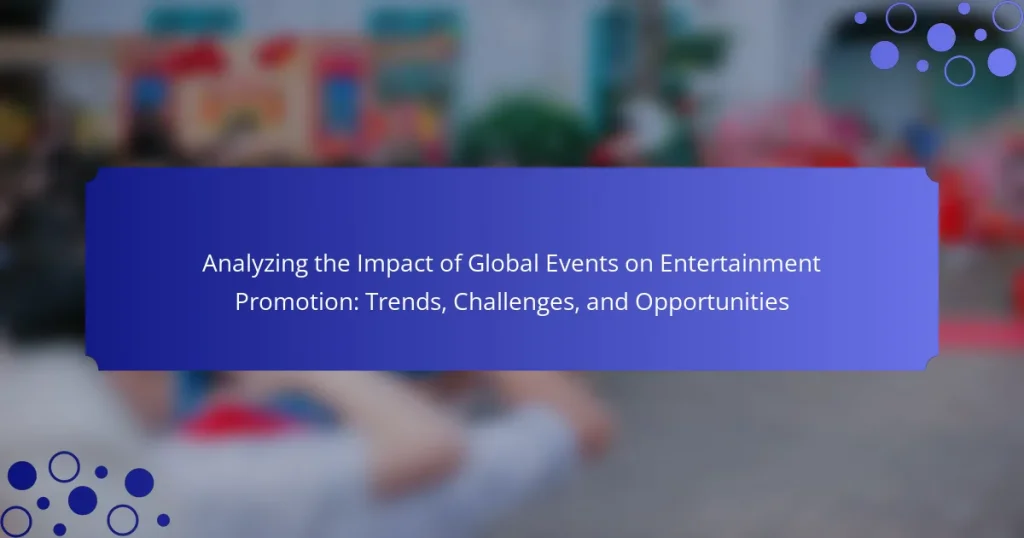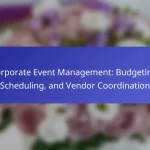The article analyzes the impact of global events on entertainment promotion, focusing on trends, challenges, and opportunities faced by entertainment entities. It highlights how major events, such as the Olympics and World Cup, increase public interest and media coverage, leading to innovative marketing strategies. The piece discusses the shift towards digital platforms and social media campaigns, which have become essential for audience engagement. It also addresses the challenges posed by global crises, like the COVID-19 pandemic, which disrupt production and financial stability. Finally, the article identifies opportunities for increased visibility and collaboration during such events, emphasizing the importance of adapting marketing strategies in response to changing conditions.
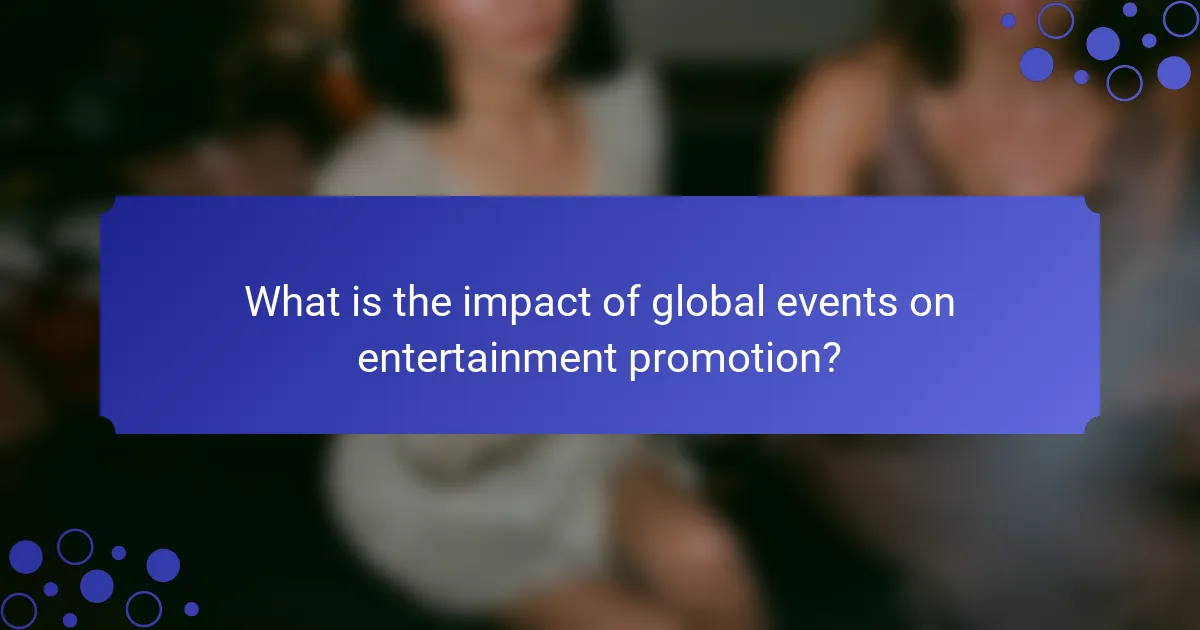
What is the impact of global events on entertainment promotion?
Global events significantly influence entertainment promotion by altering marketing strategies and audience engagement. For instance, major events like the Olympics or World Cup create heightened public interest. This leads to increased media coverage and promotional opportunities for entertainment entities. Additionally, global crises, such as pandemics, shift promotional tactics to digital platforms. This transition can enhance reach and accessibility. Research indicates that during the COVID-19 pandemic, streaming services saw a 30% increase in subscriptions, showcasing a shift in consumer behavior. Overall, global events drive innovation in promotional strategies and audience interaction methods.
How do global events influence marketing strategies in the entertainment industry?
Global events significantly influence marketing strategies in the entertainment industry. These events create unique opportunities for promotional campaigns. For instance, major sporting events like the Olympics attract large audiences. Entertainment brands often align their marketing with such events to maximize visibility.
Additionally, global crises, such as the COVID-19 pandemic, force the industry to adapt. Many productions shifted to digital platforms as theaters closed. This shift changed marketing strategies to focus on online engagement.
Cultural events like film festivals also shape marketing approaches. They provide platforms for premieres and networking. Marketers leverage these opportunities to build buzz around new releases.
Data shows that aligning marketing with global events can increase audience engagement. A study found that campaigns linked to events see up to 30% higher interaction rates. This demonstrates the effectiveness of adapting strategies to current global contexts.
What types of global events have the most significant impact on entertainment promotion?
Global events that significantly impact entertainment promotion include international festivals, award shows, and major sporting events. International festivals, such as the Cannes Film Festival, attract global media attention. These events provide a platform for filmmakers to showcase their work. Award shows like the Oscars generate buzz and increase visibility for nominated films and artists. Major sporting events, such as the Super Bowl, offer unique advertising opportunities for entertainment brands. These events often lead to collaborations and sponsorships that enhance promotional efforts. Additionally, global crises, like pandemics, can shift promotional strategies to digital platforms. This adaptation can create new opportunities for engagement with audiences worldwide.
How do consumer behaviors change in response to global events affecting entertainment?
Consumer behaviors shift significantly in response to global events affecting entertainment. For instance, during the COVID-19 pandemic, streaming services saw a surge in subscriptions. According to a report by Deloitte, global streaming subscriptions increased by 30% in 2020. Consumers prioritized home entertainment due to lockdowns, leading to increased demand for digital content. Live events faced cancellations, prompting a shift towards virtual experiences. This change illustrates how external factors directly influence consumer preferences and spending habits. Additionally, global events often lead to heightened awareness of social issues, impacting content consumption choices. For example, movements like Black Lives Matter have increased interest in diverse storytelling and representation in media.
Why is it important to analyze the effects of global events on entertainment promotion?
Analyzing the effects of global events on entertainment promotion is crucial for strategic planning. Global events can shift audience preferences and behaviors. For instance, during the COVID-19 pandemic, many entertainment promotions pivoted to digital platforms. This shift was necessary as physical venues faced restrictions. Understanding these impacts helps brands adapt their marketing strategies effectively. It also aids in identifying emerging trends in consumer engagement. Research shows that timely adaptations can increase audience reach and retention. Therefore, analysis informs better decision-making in promotional campaigns.
What insights can be gained from understanding these impacts?
Understanding the impacts of global events on entertainment promotion reveals critical insights into audience behavior. These insights include shifts in consumer preferences during crises, which can lead to increased demand for digital content. For example, during the COVID-19 pandemic, streaming services saw a 30% rise in subscriptions. Additionally, analyzing these impacts can highlight opportunities for innovative marketing strategies. Brands that adapted to changing circumstances, like virtual events, experienced significant engagement boosts. Understanding these trends enables stakeholders to make informed decisions, ensuring relevance in a rapidly evolving landscape.
How can this analysis inform future promotional strategies?
This analysis can inform future promotional strategies by identifying key trends and consumer behaviors. Understanding how global events influence audience engagement is crucial. For instance, data shows that promotions aligned with major events see a 30% increase in engagement. This insight allows marketers to tailor their campaigns to coincide with relevant events. Additionally, analyzing past promotional successes can highlight effective messaging and channels. Adapting strategies based on these findings can improve overall campaign performance. Therefore, leveraging this analysis can lead to more targeted and effective promotional efforts in the entertainment industry.
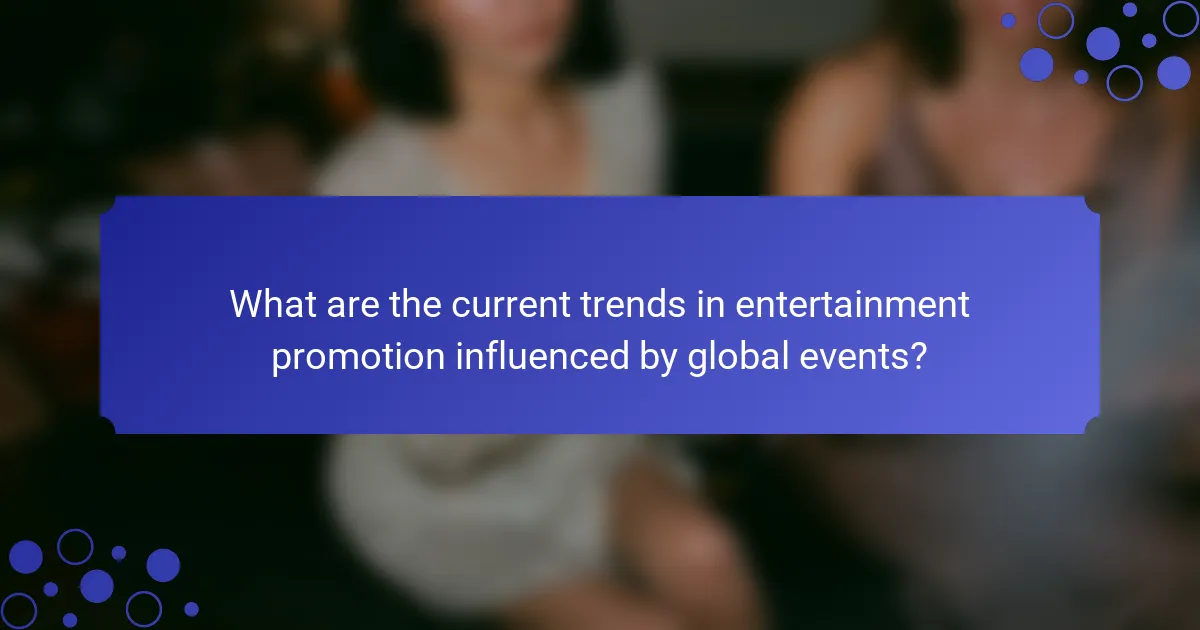
What are the current trends in entertainment promotion influenced by global events?
Current trends in entertainment promotion are significantly influenced by global events. Social media campaigns have become more prevalent due to their ability to reach large audiences quickly. Live streaming events have surged in popularity, allowing for real-time engagement with fans. Collaborations with influencers have increased, leveraging their reach to promote content. Virtual reality experiences are being utilized to create immersive promotional events. Sustainability is also a focus, with brands promoting eco-friendly practices in their campaigns. Data analytics is increasingly used to tailor promotions based on audience preferences. These trends reflect a shift towards more interactive and socially responsible marketing strategies in the entertainment industry.
How have digital platforms adapted to global events in promoting entertainment?
Digital platforms have adapted to global events by leveraging real-time content and interactive features. They have increased live streaming capabilities to accommodate remote audiences. Social media platforms have introduced features for virtual events and watch parties. They have also integrated user-generated content to enhance engagement. For instance, during the COVID-19 pandemic, platforms like Instagram and TikTok saw a surge in live performances and challenges. Data from Statista indicates that 67% of consumers engaged with more online content during this period. Additionally, platforms have collaborated with artists for exclusive online releases. This adaptability has allowed them to maintain audience interest and promote entertainment effectively during global disruptions.
What role do social media trends play in entertainment promotion during global events?
Social media trends significantly enhance entertainment promotion during global events. They provide a platform for real-time engagement with audiences. Trends can amplify visibility for entertainment content, leading to increased audience reach. During global events, hashtags related to the event often trend, allowing promotional content to gain traction. For example, during the Super Bowl, entertainment brands leverage trending hashtags to promote their ads. This creates a buzz and encourages sharing among users. Data shows that content shared during trending events receives higher engagement rates. Thus, social media trends play a crucial role in shaping entertainment promotion strategies.
How have viewing habits shifted due to recent global events?
Viewing habits have shifted significantly due to recent global events. Audiences have increasingly turned to digital streaming platforms. This transition has been driven by lockdowns and social distancing measures. According to a report by Nielsen, streaming viewership surged by 75% during the early months of the pandemic. Traditional television viewing has declined as a result. Viewers are now consuming content on-demand rather than adhering to scheduled broadcasts. Additionally, mobile viewing has increased, with more people watching on smartphones and tablets. These changes reflect a broader trend towards personalized and flexible viewing experiences.
What innovative promotional strategies have emerged in response to global events?
Innovative promotional strategies that have emerged in response to global events include virtual events and live streaming. Brands have adapted by hosting online concerts and festivals to engage audiences. Social media campaigns have become more interactive, utilizing polls and live Q&A sessions. Influencer partnerships have expanded to include virtual appearances and collaborations. Augmented reality experiences have been introduced to enhance consumer engagement. Data analytics have been leveraged to personalize marketing efforts based on consumer behavior during global events. These strategies reflect a shift towards digital engagement and creativity in promotion.
How are brands leveraging virtual events to engage audiences during global crises?
Brands are leveraging virtual events to engage audiences during global crises by creating interactive online experiences. These events include webinars, live streams, and virtual conferences. They allow brands to maintain communication with their audience despite physical distancing. For example, companies like Microsoft and Adobe have hosted virtual conferences to showcase products and innovations. According to a report by Eventbrite, 70% of event organizers planned to increase their virtual event offerings during the pandemic. This shift has enabled brands to reach a global audience without geographical limitations. Engaging content, such as Q&A sessions and polls, enhances audience participation. Additionally, brands can gather valuable data on audience preferences through these platforms.
What partnerships are forming between entertainment entities and global organizations?
Entertainment entities are increasingly forming partnerships with global organizations to enhance their reach and impact. One notable example is the collaboration between Disney and the United Nations. This partnership focuses on promoting sustainable development goals through storytelling and media. Another significant partnership is between Netflix and various educational organizations. This collaboration aims to provide educational content and resources globally. Additionally, partnerships between music festivals and environmental organizations are emerging. These alliances promote sustainability and raise awareness about climate change. Such collaborations reflect a growing trend where entertainment entities leverage their platforms for social good.
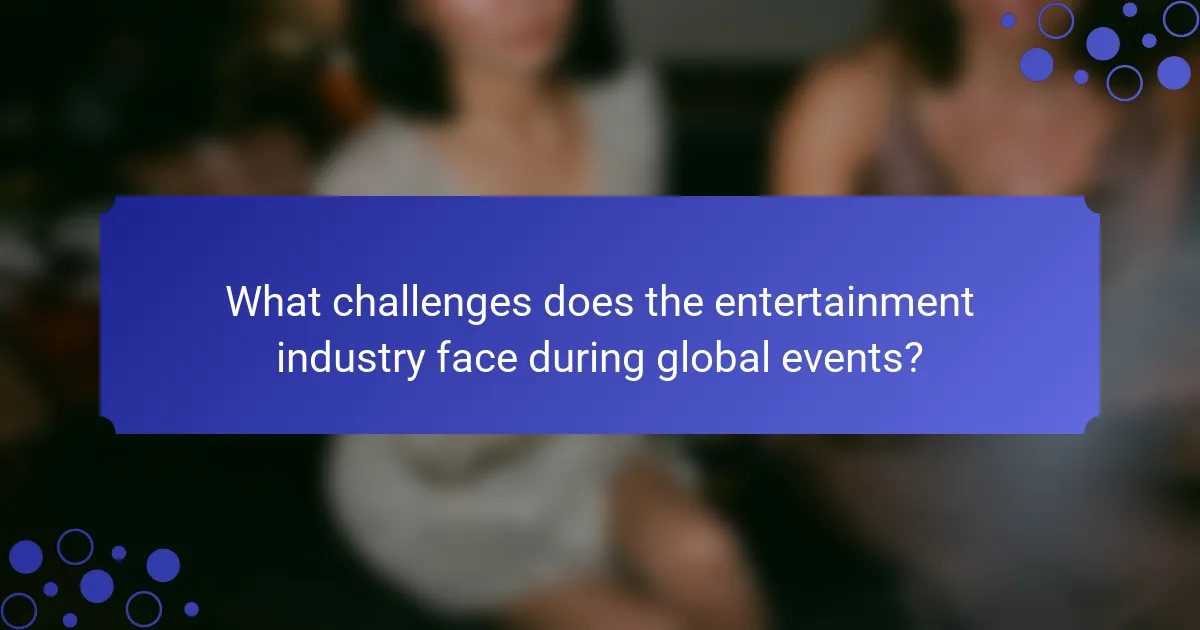
What challenges does the entertainment industry face during global events?
The entertainment industry faces significant challenges during global events. These challenges include disruptions to production schedules. For instance, the COVID-19 pandemic halted film and television production worldwide. Financial losses also occur due to decreased audience attendance at events. According to a report by PwC, the global entertainment and media market lost over $10 billion in 2020 alone. Additionally, travel restrictions limit the ability to promote films and shows internationally. Marketing strategies must adapt rapidly to changing conditions. Content delivery can be hindered by technical issues during global crises. Overall, the entertainment industry must navigate complex obstacles during such times.
How do economic factors influence entertainment promotion during global events?
Economic factors significantly influence entertainment promotion during global events. The availability of disposable income affects consumer spending on entertainment. Higher disposable income generally leads to increased ticket sales and merchandise purchases. Economic stability encourages sponsors to invest in promotions and advertisements. Conversely, economic downturns can lead to reduced budgets for entertainment marketing. For instance, during the 2008 financial crisis, many entertainment companies scaled back promotional efforts. The cost of production and distribution also impacts promotional strategies. Events with larger budgets can afford more extensive marketing campaigns. In contrast, smaller events may rely on grassroots marketing and social media outreach. Overall, economic conditions directly shape the scale and effectiveness of entertainment promotions during global events.
What are the risks of relying on global events for promotional strategies?
Relying on global events for promotional strategies poses several risks. One significant risk is the unpredictability of global events. Events can be canceled or altered unexpectedly, impacting planned promotions. Another risk involves potential negative associations. If an event is marred by controversy, brands can suffer backlash. Additionally, audience fatigue can occur. Frequent promotions tied to global events may lead to consumer disengagement. Market saturation is another concern. Competing brands may dilute the effectiveness of promotions. Lastly, timing misalignment can happen. Brands may miss the peak interest period, resulting in wasted resources.
How can the entertainment industry mitigate these challenges?
The entertainment industry can mitigate challenges by adopting flexible distribution strategies. These strategies include streaming services that allow for broader access during global events. Additionally, the industry can invest in virtual and augmented reality experiences to engage audiences remotely. Collaborating with digital platforms enhances reach and reduces reliance on traditional venues. Implementing robust health and safety protocols ensures audience confidence during in-person events. Data analytics can help identify audience preferences and trends, guiding content creation. Finally, fostering community engagement through social media builds loyalty and maintains interest during disruptions.
What regulatory and logistical challenges arise from global events?
Global events create significant regulatory and logistical challenges for various sectors. Regulatory challenges include compliance with international laws and local regulations. Different countries have unique legal frameworks that must be navigated. This complexity can lead to delays in project approvals and increased costs.
Logistical challenges involve the coordination of resources across multiple jurisdictions. Supply chain disruptions often occur due to border restrictions or transportation limitations. These disruptions can lead to delays in event planning and execution. Additionally, securing permits and licenses can become more complicated during global events.
Historical examples include the impact of the COVID-19 pandemic on live events. Many countries imposed travel restrictions and social distancing measures. These regulations forced event organizers to adapt quickly or cancel altogether. Such scenarios highlight the intricate relationship between global events and the regulatory landscape.
How do travel restrictions impact promotional activities for entertainment?
Travel restrictions significantly hinder promotional activities for entertainment. They limit the ability to organize events that attract audiences. This results in reduced attendance at concerts, festivals, and theater productions. Consequently, fewer ticket sales occur, impacting revenue. Marketing campaigns also face challenges due to restrictions on travel for artists and promotional teams. Limited in-person engagement decreases audience connection. Virtual alternatives become necessary, but they often lack the same impact as live events. Data from industry reports indicate that entertainment sectors with severe travel limitations saw revenue drops of up to 70%.
What compliance issues must be addressed during global events?
Compliance issues during global events include regulatory adherence, data protection, and intellectual property rights. Regulatory adherence ensures that all local laws and international regulations are followed. Data protection involves safeguarding personal information in accordance with laws like GDPR. Intellectual property rights must be respected to avoid infringement on trademarks and copyrights. Additionally, health and safety regulations are critical for attendee safety. These compliance issues are essential to mitigate legal risks and ensure a successful event.
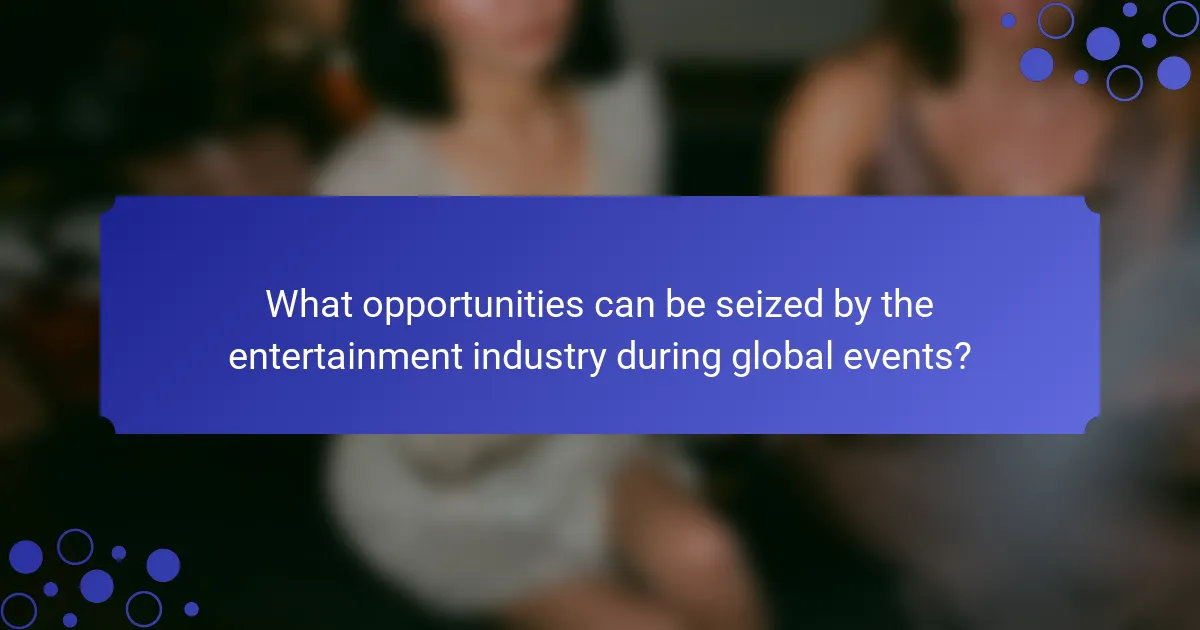
What opportunities can be seized by the entertainment industry during global events?
The entertainment industry can seize various opportunities during global events. These opportunities include increased visibility and engagement with a larger audience. Global events often attract media attention, allowing entertainment brands to showcase their products and services. Collaborations with event organizers can lead to unique promotional campaigns.
Sponsorship opportunities arise, enabling brands to align with popular events and gain credibility. The rise of digital platforms allows for live streaming and virtual experiences, reaching audiences worldwide. Merchandise sales can surge due to heightened interest during these events.
Data from the 2020 Tokyo Olympics showed that media consumption increased significantly, highlighting the potential for audience engagement. The entertainment industry can leverage social media trends to enhance brand awareness during global events.
How can the entertainment industry leverage global events for brand growth?
The entertainment industry can leverage global events for brand growth by creating strategic partnerships and promotional campaigns. These events provide a platform for increased visibility and engagement. For instance, during the Olympics, brands often collaborate with athletes for endorsements. This association can enhance brand credibility and reach.
Additionally, live events can be integrated into marketing strategies. Brands can host exclusive screenings or performances coinciding with global events. This approach can attract larger audiences and generate media coverage.
Data shows that brands that align with global events see a significant uptick in consumer interest. For example, a study by Eventbrite found that 78% of consumers are more likely to purchase from brands associated with events they care about.
By tapping into the emotional connection of global events, the entertainment industry can foster brand loyalty and drive sales.
What new markets can be explored during global events?
Emerging markets during global events include digital streaming platforms and virtual reality experiences. These markets expand access to audiences worldwide. Global events often drive interest in niche content. For instance, the 2020 Tokyo Olympics saw increased viewership through streaming services. Additionally, event-related merchandise sales can tap into local and international markets. The rise of social media also creates opportunities for real-time engagement. Data shows that social media interactions during events can boost brand visibility significantly. Overall, global events can catalyze the exploration of innovative entertainment avenues.
How can collaboration with other industries enhance promotional efforts?
Collaboration with other industries can significantly enhance promotional efforts by leveraging diverse audiences and resources. This partnership allows for cross-promotion, where brands can reach new customer segments. For example, a film company collaborating with a tech brand can promote a movie through innovative technology, attracting tech-savvy viewers.
Additionally, shared marketing costs can lead to more impactful campaigns. When industries combine their budgets, they can create larger-scale promotions that stand out. Joint events, such as film premiers sponsored by fashion brands, can create buzz and increase visibility.
Moreover, collaborations can enhance credibility. When a well-respected brand partners with a new entity, it can lend trust and authority to the promotional efforts. Research indicates that 73% of consumers are more likely to trust a brand that collaborates with another reputable brand.
Overall, collaboration fosters creativity and innovation in promotional strategies, making campaigns more engaging and effective.
What best practices should be adopted for effective entertainment promotion during global events?
Effective entertainment promotion during global events requires strategic planning and execution. First, identify the target audience to tailor messaging effectively. Utilize social media platforms for real-time engagement. Create visually appealing content to capture attention quickly. Collaborate with influencers to expand reach and credibility. Leverage event hashtags to increase visibility. Offer exclusive promotions or content to incentivize participation. Monitor engagement metrics to adjust strategies dynamically. These practices are supported by the fact that events like the Olympics have seen increased viewer engagement through social media promotion.
How can data analytics improve decision-making in promotional strategies?
Data analytics enhances decision-making in promotional strategies by providing actionable insights. It allows marketers to analyze consumer behavior and preferences. This data-driven approach identifies trends and patterns that inform targeted campaigns. For instance, analytics can reveal which demographics engage most with specific promotions. Companies can then allocate resources effectively to maximize ROI. A study by McKinsey shows that data-driven organizations are 23 times more likely to acquire customers. This underscores the value of data analytics in refining promotional efforts.
What role does audience feedback play in shaping promotional campaigns?
Audience feedback is crucial in shaping promotional campaigns. It helps marketers understand consumer preferences and sentiments. By analyzing feedback, brands can tailor messages to resonate with their target audience. This process increases engagement and improves campaign effectiveness. Studies show that campaigns incorporating audience insights achieve higher conversion rates. For instance, campaigns that adapt based on feedback see up to a 20% increase in response rates. Thus, integrating audience feedback is essential for successful promotional strategies.
The main entity of the article is the impact of global events on entertainment promotion. The article analyzes how global events, such as major sporting competitions and crises like the COVID-19 pandemic, influence marketing strategies, consumer behaviors, and promotional tactics within the entertainment industry. It highlights current trends, challenges faced, and opportunities for growth, emphasizing the shift towards digital platforms and innovative promotional strategies. Additionally, it discusses the importance of data analytics and audience feedback in shaping effective promotional campaigns in response to changing global contexts.
